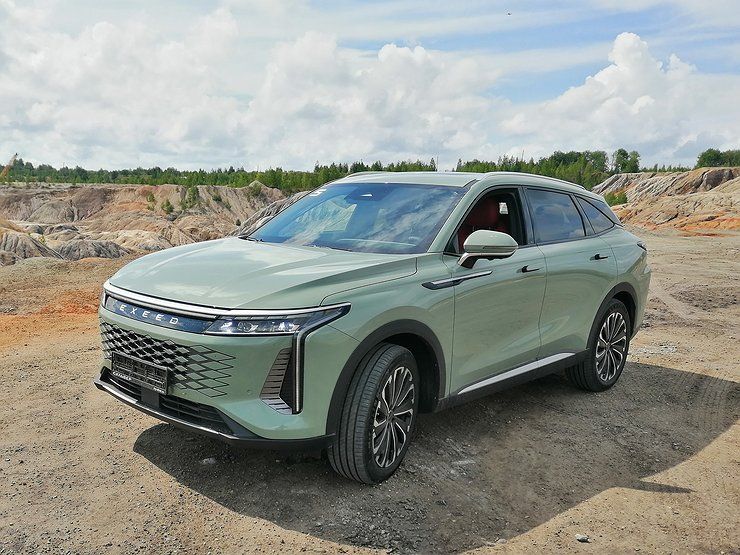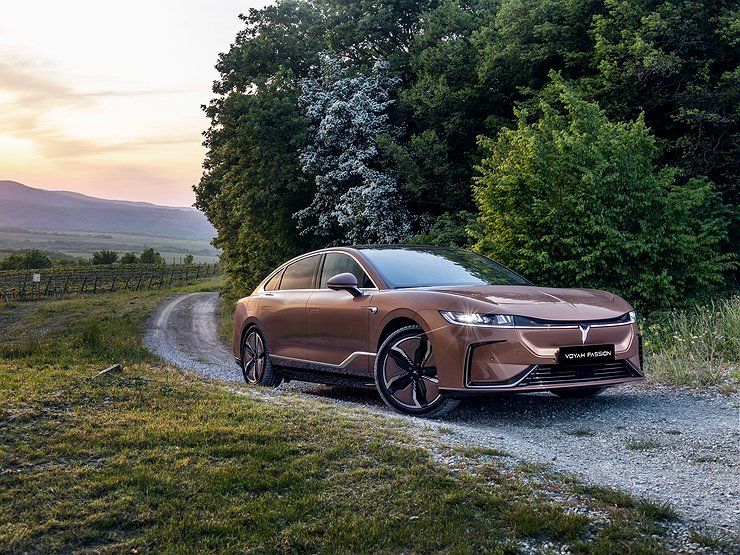Why Chinese premium cars are doomed to failure not only in Russia
- November 21, 2023
- 0
After foreign brands left the Russian market, the niche of premium cars was not only empty, but also quite impoverished. Models loved by snobs now have to be
After foreign brands left the Russian market, the niche of premium cars was not only empty, but also quite impoverished. Models loved by snobs now have to be

After foreign brands left the Russian market, the niche of premium cars was not only empty, but also quite impoverished. Models loved by snobs now have to be delivered to order via parallel import, which is very slow, expensive and without warranty. The AutoVzglyad portal found out why such an attractive piece of land has not yet been filled by the Chinese.
Anti-Russian sanctions, enthusiastically supported by European politicians, officially forced premium car manufacturers to leave the attractive Russian market. Good riddance, as they say. The problem is actually slightly different: contrary to the saying that a holy place is never empty, according to the Hamburg report, no one has bothered to replace the retired players so far. First of all, the absence of Chinese companies in this area is surprising. After all, they seem to be able to break through any mosquito net, just like agile insects.
At first glance this is really strange. All experts agree that Chinese cars are not inferior in technical terms and design to European, and even more so to Korean or Japanese, competitors. They easily list brands that could qualify for premium status. In particular, the Autostat agency quotes the opinion of the head of the press service of the Expocar Group of Companies, Alexander Kovalev, who believes that among the brands presented on the Russian market are Exeed, Tank, Hongqi and, for example, GAC with the GS8 model has the desired status. With some reservations, this view is also supported by Andrey Terlyukevich, General Director of the AutoSpetsCenter Group of Companies.
Let’s forgive retail bosses for their obsessive desire to include electric cars like Voyah in the list of ‘premiums’ – with exorbitant prices and paltry sales. After all, they have to stick to the trend, no matter how ridiculous it is. The craze for “eco-friendly” transportation isn’t going away anytime soon; that is not why huge amounts of money have been and continue to be pumped into their propaganda at a global level, and dealers still have the opportunity to make a lot of money from this.
However, the Russian population is in no hurry to recognize the above brands, even with traditional combustion engines, as premium brands. The country stubbornly believes that even government car supplier Hongqi is not worthy of such an honor. And there are serious reasons for this, which the same Alexander Kovalev mentioned in passing: “Of course, most Chinese brands are inferior to European brands in terms of brand strength.”
That’s not the word for losing – outright. And not just ‘premium’, but also the vast majority of other brands that have never tried to claim such an honor. That’s no wonder, because in order for buyers to recognize your products as premium – regardless of whether it is deserved or not – you have to work on the brand’s image for decades and invest significant amounts of money in the process, so that later they start to pay. discount due to the unorthodox inflated price.
Success on this path is not always guaranteed, even with meticulous implementation of the above ritual actions. Audi was never able to fully realize its ambitions. Neither Mercedes nor BMW consider the Ingolstadt company as a full-fledged ‘third party’ and to this day look at its attempts with a skeptical grin. Volvo suffered an even more offensive fiasco, constantly calling itself a “premium car manufacturer” but never convincing its target audience of that.
Only particularly naive characters fell for the “cunning move” of the Japanese, who decided to immediately conquer the unruly heights and present their crafts as “premium” for the American market. And not very naive ones, like the magnificent Jeremy Clarkson, grinned condescendingly: “Nissan just wrote Infiniti on the back of Datsun. A felt-tip pen. In the hope that the Americans will fall for it. They fell for it.”
As the AvtoVzglyad portal has already written, the marketing strategy that is self-evident to Europeans, Koreans and Japanese is completely alien to the Chinese. They appeared on the car market too late and they simply do not have the time to carefully and painstakingly cultivate any brand with the aim of harvesting it in about twenty years. They don’t care about this topic at all and produce new and new brands at the speed of a crazy printer, hoping that some will definitely ‘appeal’ to the public. Well, the rest can be written off as scrap without regret.
So it is a thankless task to expect that real rivals of the Bavaria or Stuttgart from the Middle Kingdom will appear on the Russian (and not only Russian) market. They aren’t and they won’t be because the world is changing. O tempora, O morals!


After foreign brands left the Russian market, the niche of premium cars was not only empty, but also quite impoverished. Models loved by snobs now have to be delivered to order via parallel import, which is very slow, expensive and without warranty. The AutoVzglyad portal found out why such an attractive piece of land has not yet been filled by the Chinese.
Anti-Russian sanctions, enthusiastically supported by European politicians, officially forced premium car manufacturers to leave the attractive Russian market. Good riddance, as they say. The problem is actually slightly different: contrary to the saying that a holy place is never empty, according to the Hamburg report, no one has bothered to replace the retired players so far. First of all, the absence of Chinese companies in this area is surprising. After all, they seem to be able to break through any mosquito net, just like agile insects.
At first glance this is really strange. All experts agree that Chinese cars are not inferior in technical terms and design to European, and even more so to Korean or Japanese, competitors. They easily list brands that could qualify for premium status. In particular, the Autostat agency quotes the opinion of the head of the press service of the Expocar Group of Companies, Alexander Kovalev, who believes that among the brands presented on the Russian market are Exeed, Tank, Hongqi and, for example, GAC with the GS8 model has the desired status. With some reservations, this view is also supported by Andrey Terlyukevich, General Director of the AutoSpetsCenter Group of Companies.
Let’s forgive retail bosses for their obsessive desire to include electric cars like Voyah in the list of ‘premiums’ – with exorbitant prices and paltry sales. After all, they have to stick to the trend, no matter how ridiculous it is. The craze for “eco-friendly” transportation isn’t going away anytime soon; that is not why huge amounts of money have been and continue to be pumped into their propaganda at a global level, and dealers still have the opportunity to make a lot of money from this.
However, the Russian population is in no hurry to recognize the above brands, even with traditional combustion engines, as premium brands. The country stubbornly believes that even government car supplier Hongqi is not worthy of such an honor. And there are serious reasons for this, which the same Alexander Kovalev mentioned in passing: “Of course, most Chinese brands are inferior to European brands in terms of brand strength.”
That’s not the word for losing – outright. And not just ‘premium’, but also the vast majority of other brands that have never tried to claim such an honor. That’s no wonder, because in order for buyers to recognize your products as premium – regardless of whether it is deserved or not – you have to work on the brand’s image for decades and invest significant amounts of money in the process, so that later they start to pay. discount due to the unorthodox inflated price.
Success on this path is not always guaranteed, even with meticulous implementation of the above ritual actions. Audi was never able to fully realize its ambitions. Neither Mercedes nor BMW consider the Ingolstadt company as a full-fledged ‘third party’ and to this day look at its attempts with a skeptical grin. Volvo suffered an even more offensive fiasco, constantly calling itself a “premium car manufacturer” but never convincing its target audience of that.
Only particularly naive characters fell for the “cunning move” of the Japanese, who decided to immediately conquer the unruly heights and present their crafts as “premium” for the American market. And not very naive ones, like the magnificent Jeremy Clarkson, grinned condescendingly: “Nissan just wrote Infiniti on the back of Datsun. A felt-tip pen. In the hope that the Americans will fall for it. They fell for it.”
As the AvtoVzglyad portal has already written, the marketing strategy that is self-evident to Europeans, Koreans and Japanese is completely alien to the Chinese. They appeared on the car market too late and they simply do not have the time to carefully and painstakingly cultivate any brand with the aim of harvesting it in about twenty years. They don’t care about this topic at all and produce new and new brands at the speed of a crazy printer, hoping that some will definitely ‘appeal’ to the public. Well, the rest can be written off as scrap without regret.
So it is a thankless task to expect that real rivals of the Bavaria or Stuttgart from the Middle Kingdom will appear on the Russian (and not only Russian) market. They aren’t and they won’t be because the world is changing. O tempora, O morals!
Source: Avto Vzglyad
Donald Salinas is an experienced automobile journalist and writer for Div Bracket. He brings his readers the latest news and developments from the world of automobiles, offering a unique and knowledgeable perspective on the latest trends and innovations in the automotive industry.